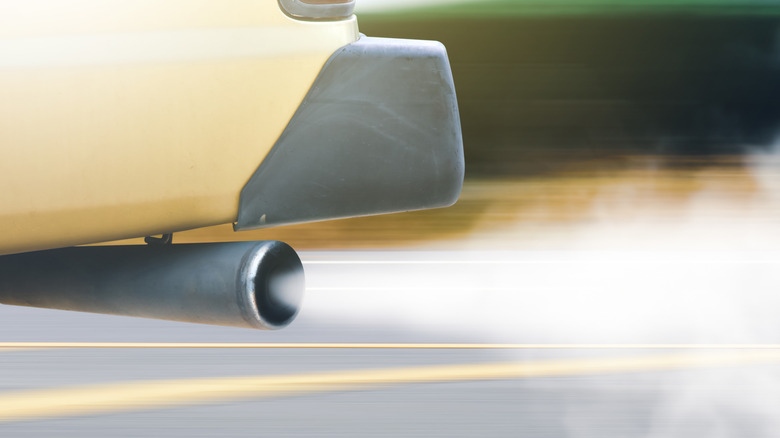Here's What White Smoke From Diesel Exhaust Could Mean
A well-running and adequately maintained diesel engine should produce no visible smoke from the tailpipe. Modern diesel engines equipped with common-rail direct-injection technology have unlocked more power and torque without emitting plumes of sooty, black smoke. Older diesels are relatively acceptable for spewing black smoke when gunning the accelerator pedal, but too much smoke could mean it's time to visit the mechanic.
For instance, excessive black smoke could mean issues with how the engine combusts the air and diesel fuel, which could point to clogged or damaged fuel injectors, a clogged air filter, improper timing, wrong air/fuel ratio, or sludge build-up. Black smoke means there's too much or a shortage of fuel in the combustion chamber or too much or too little air. Either way, black diesel smoke indicates a problem that needs immediate attention.
Meanwhile, blue smoke means the engine burns too much oil and could point to worn piston rings, damaged cylinders, faulty stem seals, or defective PCV valves. Blue smoke could also come from overfilling the engine with oil or using the wrong grade of diesel oil.
White diesel smoke spells trouble
Diesel engines that emit white smoke could have a problem with the injectors, or the engine is burning coolant and may have a leak in the head gasket. White smoke indicates unburned diesel is exiting the tailpipe, and you should be careful not to come into contact with the smoke as it will irritate the eyes and skin.
Sometimes, it's pretty standard for diesel engines to emit white smoke upon starting in chilly weather due to condensation. But if the smoke doesn't vanish even after the engine is warm, it could point to damaged or inefficient fuel injectors, wrong injection timing, low compression, problems with the timing gear, a failing fuel pump, or issues with the cylinder head or a leaking head gasket.
Again, an occasional exhale of white or black smoke when accelerating hard is acceptable. But if the smoke is relentless (especially during idling), it's best to take your vehicle to a mechanic for a thorough diagnosis.

